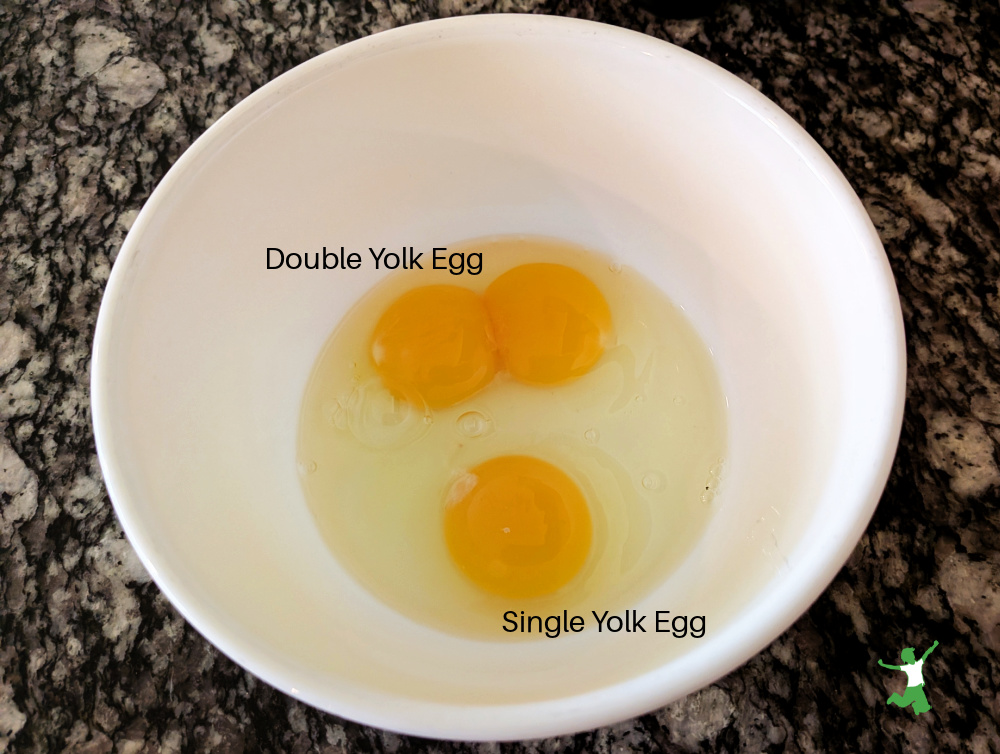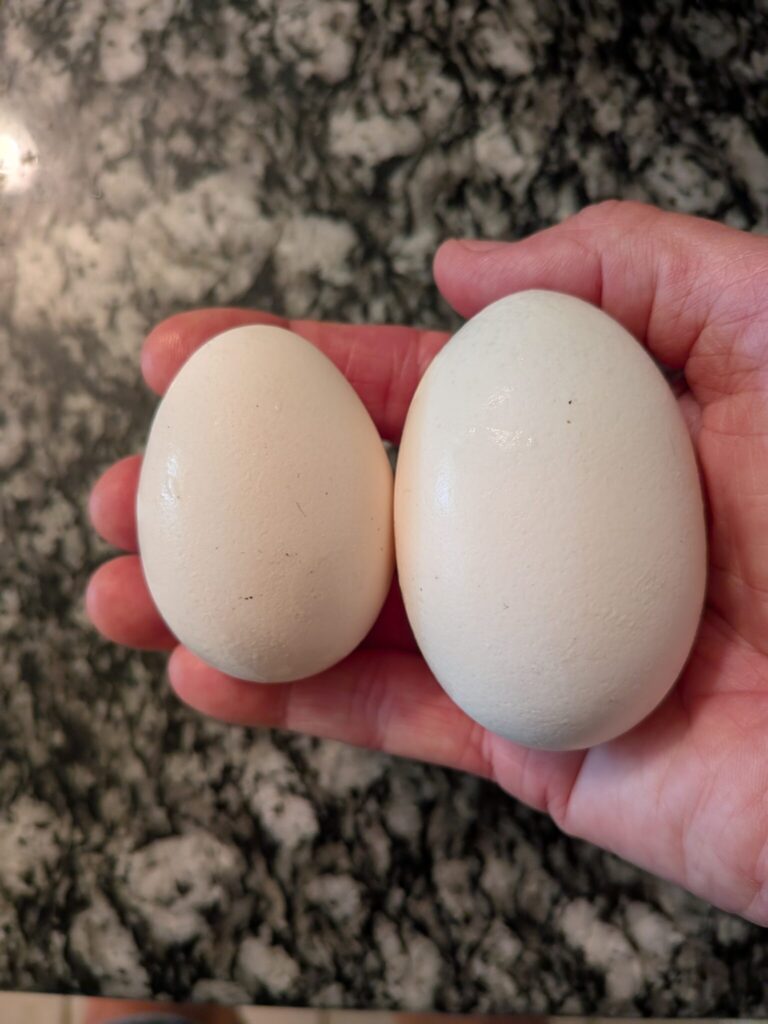The amazing phenomenon of double yolk eggs, how they compare to single yolk store eggs, and tips on getting more of these beauties from your hens!

One of the biggest benefits of keeping backyard chickens is that you get to enjoy eggs that you would rarely (if ever) come across buying organic store eggs.
Eggs you generally don’t see in cartons from the store are what’s called “double yolkers”. They are roughly the size of duck eggs!
Another example is eggs with “meat spots”.
Below is a picture of a double yolk egg that one of my newly laying White Leghorn hens gifted us recently.
Note the size of the double yolker compared to a single yolk egg.
These two eggs were laid by the same young hen!
I really hit the jackpot with this sweet bird ❤️
As you can see from the picture above, each yolk in the double egg is roughly the same size as the yolk in the single egg.
Since the yolk is the most nutritious part of an egg (can you believe some folks still throw them out?), you really do get “two for the price of one”.

While I am fortunate to have a hen that is only six months old laying double yolkers, these beauties typically come from older hens.
This is why you don’t see double yolk eggs in the store from industrialized farms even if organically certified.
Hens from mass production farms are normally culled for meat after only a year or so….as soon as their egg production starts to drop or their first molt, whichever comes first, according to what I’ve been told by those in the industry.
The commercial egg industry also prefers eggs from young hens (under a year and a half old) as this ensures uniformity of size for packing/shipping in egg cartons.
Eggs get larger in size with the age of the hen in my experience. Hence, the propensity for double yolk eggs from older birds.
If you’ve never seen double yolk eggs before, why not?
Are you still supporting the industrial food complex by purchasing eggs at the store?
Note that store eggs, even if organic, may be weeks old (or months old if partially frozen in storage) by the time you buy them. In addition, they are washed with undesirable chemicals as this is required in the United States.
Because eggshells are porous, some of this is no doubt getting into the eggs!
Read more details about the scam of organic store eggs and organic egg washing practices at the provided links.
Contrary to popular belief, a nutritious egg is not all about the yolk color, because this can easily be manipulated with feed to fool the consumer if the hens aren’t truly pastured.
I recommend getting your eggs from one of the sources below to ensure legit yolk color and to avoid the toxic practices that are allowed under USDA Organic for mass production facilities.
- Your own backyard coop (best)
- A neighbor
- Farmer’s market
- Independently owned health food stores that source from local egg farms.
You don’t need any double blind studies to see and taste the difference.
Your five senses will do just fine, thank you!








Do you know of a farm that I can buy eggs in South Florida? Miami area?
Best!
LDA
I have no idea. Sorry. 🙁 Best to contact your local Weston A. Price Chapter Leader for your area to get a list (westonaprice.org)
Our family thrives on our little flock’s eggs. We keep about 12 layers at a time and could sell many more if we had them. People tell us they love the beautiful, healthy, hard-shelled eggs, and the rich, bursting with flavor, yolks. I personally feel that a farm fresh egg is healthier when it is a single (normal) egg, but that’s just me. I grew up on fresh farm eggs so “double yolkers” were seen quite often. At any rate, the real point is, there is nothing like fresh eggs straight from happy hens. And people tell us that ours are the best they’ve tasted from sellers around the area. I love our chickens! At $3 a dozen they are a bargain to those we share them with.
Fun post! 🙂 Thanks!
We get at least one double yolk egg a day from our flock of chickens. It’s always exciting every time we crack one open. However, we’ve found that there are two downfalls for us when it comes to the double yoke eggs.
Our “red star” hens (a crossbreed bred specifically for laying) lay most of our double yoke eggs. They are our youngest hens. A handful of those hens seem to lay double yokes a couple times every week. The downfall is that whenever they lay a double yoke, they skip laying an egg the next day…. The double yoke is like two eggs combined into one egg. The other downfall is that we can’t fit these huge eggs in cartons! lol! As someone mentioned before, double yokes can be a problem for breeding/hatching new chicks. This isn’t a problem for us though (at least not yet), because we don’t hatch our own chicks.
Anyway! Despite the double yoke downfalls, they are still super cool!! They are definitely an exciting perk to raising your own chickens.
Our city, Grand Rapids, MI has been fighting w/ the city to let us have city chickens in our backyards. So far, “no go.” So depressing.
We have been buying eggs from a local health food store from a local farmer who has good practices, but compared them to a friend’s eggs whose chickens are truly pastured. What a difference.
Sarah, I wonder where you got your information that double yolks come mostly from older chickens? I have chickens and have had the same experience as Ann – when they’re first starting to lay, they give a lot of double yolk-ers, (along with some other crazy stuff – tiny eggs, eggs without shells, even two shell-less eggs joined by a thin tube once) and after a few months their reproductive systems seem to settle into normal mode and the double yolks become more rare. When we have a group just starting to lay, it’s not uncommon for half or more to be doubles.
Hi Audry, was told this by a chicken farmer.
Yes – it is my understanding from several chicken farmers that double yolks occur when hens first start laying and are much more rare as the chicken ages.
Most large store eggs taste like soapy water to me now and make me want to retch. That is why we have our own chickens and duck for eggs. Oh my gosh, they are so good. In fact, my hubby is the chicken/duck man and he just bought 4 baby ducks 2 days ago. He loves duck eggs, too. Our daughter who is married will not eat any other eggs, so we always supply her family also. Can’t be beat.
Our experience has been that when the chicken first begins to lay again or starts to lay for the first time, we get the double yolks. They do eventually stop after a time and go into “normal” egg mode. We love the double yolks and our wonderful pastured eggs. The customers clambor when we start to sell them again after the girls have taken a winter break. I refuse to buy store-bought eggs.
On the down side, I’m aware of a producer locally here that raises his chickens “free-range”. The legal means of this is that each chicken has to have access to being outside, but doesn’t say for how long. These chickens are raised in hoop houses with screened sides with dirt bottoms and fed commercial feed. In this way, the producer can lable his eggs free range. So be duped into thinking your eggs are free range. Buy right from the producer himself so you can see for yourself how your chickens are being raised. If one doesn’t greet you when you pull up, run!
I have yet to find farm-fresh eggs around me that are less expensive than at the grocery store. 🙁 But, oh well.
I actually grew up on farm fresh eggs and often had double yolkers, but haven’t had them after moving out of my parents’ house until recently when we found out that a co-worker is also a farmer. I’m not too keen on his farming practices (mainly industrial), but the eggs he gives us are from his free range flock. I loved having double yolkers again! Temporarily, anyway. They’re too big for my egg carton, which made them a pain to store. 🙂
Ever seen triple yolkers? I’ve only seen them a few times in my life, but it was the coolest thing ever! I swear my dad got a quad once when I was a teenager, but neither of us is 100% sure that we’re remembering that right.
I go back and forth on whether or not I think double-yolks are a good thing when I see it in our duck flock (which used to happen a lot, especially when our current flock was under a year old–I find it interesting that you say it happens in older birds–my upcoming flock is not laying yet so I wonder if they will lay doubles when young also? I dont’ know…). I understand that, from a consumer’s point of view, the double yolk seems like more nutrition (though in my experience it isn’t really twice as much because the doubles tend to be smaller than one large yolk, at least in a duck egg–the total egg size is only slightly larger). My concern is twofold:
1. The larger the size of the egg, the bigger the threat to the health of the layer. Hens will die if they are egg-bound.
2. If double-yolk eggs are fertilized, they will never actually be fruitful. It is impossible for poultry to have “twins”–an egg can only support a single bird, at least as a general rule. Every once in a while, you hear a story of “twin” or “triplet” eggs, and for the most part the babies can develop fairly normally, but they will die upon hatching. Usually, if you hear of survival upon hatching, these were human-assisted hatches, which can possibly result in a weaker bird than a bird that hatches on its own. Generally, I wouldn’t allow a broody bird to sit on double-yolked fertilized eggs if I could help it, because I don’t think they are a sign of optimum fertility in the sense that the odds are they will not result in new life.